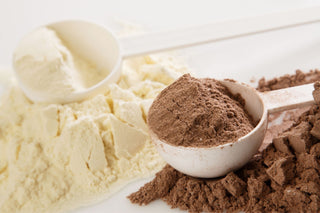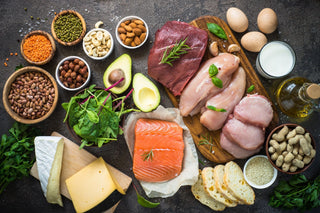
What are proteins?
Proteins are macromolecules made up of long chains of amino acids. They are one of the most important building blocks of the human body and contribute to a variety of functions, such as the construction of cells and tissues, the regulation of metabolic processes and the formation of antibodies.
Why are proteins important for the body?
Proteins are essential for the body as they are involved in many vital processes. They contribute to the maintenance and repair of tissues, support the immune system, aid in nutrient absorption and processing, and are responsible for the regulation of hormones and enzymes. A lack of protein can lead to health problems such as muscle weakness, fatigue and increased susceptibility to infections.
Functions of proteins in the body
Building materials for cells and tissues
Proteins are important building blocks for building and maintaining cells and tissues in the body. For example, they form the framework of skin, hair and nails and are involved in the regeneration of wounds.
enzyme activity
Proteins are also essential for metabolism as enzymes. Enzymes speed up chemical reactions in the body and are responsible for digestion, the breakdown of nutrients and energy production.
Transport and storage of nutrients
Proteins also play an important role in the transport and storage of nutrients. For example, they contribute to the transport of oxygen and other nutrients into the blood and serve as an energy store for the body.
regulation of metabolic processes
Proteins are also involved in the regulation of metabolic processes. For example, they influence blood sugar levels and hormone levels in the body and thus contribute to maintaining a healthy metabolism.
antibody formation
Finally, proteins also play an important role in defense against disease. They are involved in the formation of antibodies that help fight and prevent disease.

protein sources
Protein sources are important for a balanced diet and support the building of muscles, tissue and hormones in the body. There are both animal and plant-based protein sources that provide a variety of nutrients. Eating a balanced diet with adequate protein is critical to promoting health and fitness.
Animal Proteins
Meat
Meat is an excellent source of animal protein. It contains all the essential amino acids the body needs and is a great choice for people looking to meet their protein needs. Meat products like beef, chicken, and lamb are all good sources of animal protein.
Dairy products
Dairy products, like milk, cheese, and yogurt, are also good sources of animal protein. In addition to proteins, they also contain important nutrients such as calcium and vitamin D.
eggs
Eggs are another good source of animal protein. They contain all the important amino acids and are of particularly high quality because they contain almost all the nutrients that the body needs.
Vegetable Proteins
legumes
Omega-3 fatty acids can relieve joint pain by reducing inflammation.
nuts and seeds
Nuts and seeds, like almonds, pistachios, and chia seeds, are also good sources of plant-based protein. In addition to proteins, they also contain important healthy fats and nutrients.
Vegetables
Vegetables, like spinach, broccoli, and green beans, also contain some level of plant-based protein. While they don't contain as much protein as animal or plant-based protein sources, they can still be a valuable addition to a high-protein diet.

protein requirements
Recommended daily amount
The recommended daily amount of protein varies depending on age, gender and physical activity. In general, the recommended daily amount for adults is 0.8 grams per kilogram of body weight.
needs for athletes
Athletes have a higher protein requirement than non-athletes because they need to build and maintain more muscle mass. In general, athletes are recommended to consume 1.2 to 1.7 grams of protein per kilogram of body weight.
Need for certain health conditions
Individuals with certain health conditions, such as an illness or injury, may also have higher protein requirements. In such cases, you should consult a doctor or nutritionist to determine your individual protein needs.
protein supplements
Proteins: benefits as a dietary supplement
Protein supplements, like protein powder, can be a great way to meet protein needs when it's difficult to get enough protein from the diet. However, it is important to choose carefully selected protein supplements and always stick to the recommended dosage.
Types of protein powders
There are different types of protein powders, such as whey protein, soy protein, and plant-based proteins. Each type has its own pros and cons and it is important to choose the right type for your needs. For example, whey protein is one of the highest quality types of protein and is quickly absorbed by the body, while plant-based proteins can be a good choice for people who don't want to eat animal products.
Use of protein powders
Protein powder can easily be incorporated into the daily nutrition plan by adding it to smoothies, cereal or other dishes. However, it is important to stick to the recommended dosage and avoid consuming too much protein as this can have negative health effects.
The importance of proteins for the body
Proteins are important to the body and contribute to a variety of functions. There are various sources of protein, including animal and plant proteins, and it's important to get enough protein to meet your body's needs. Protein supplements, like protein powder, can be a great way to meet protein needs, but it's important to choose carefully and use in moderation.
Frequently asked questions about proteins
Below you will find answers to frequently asked questions about proteins. Protein is an important nutrient that provides a variety of health benefits and plays a crucial role in building and maintaining muscle. Still, there are many questions about taking protein supplements and the best sources of protein in the diet.








